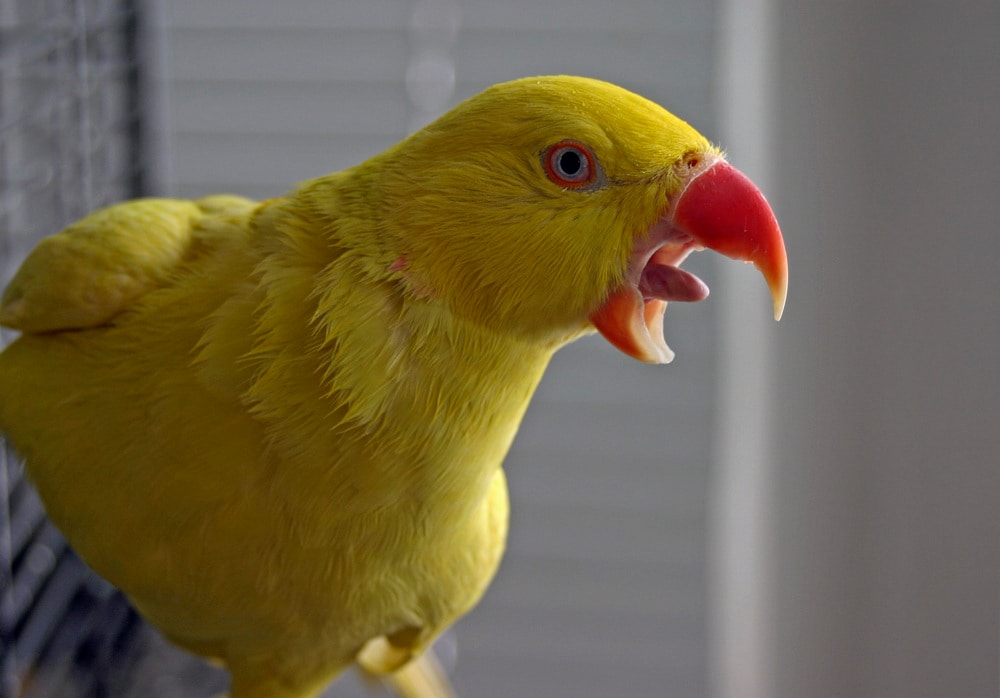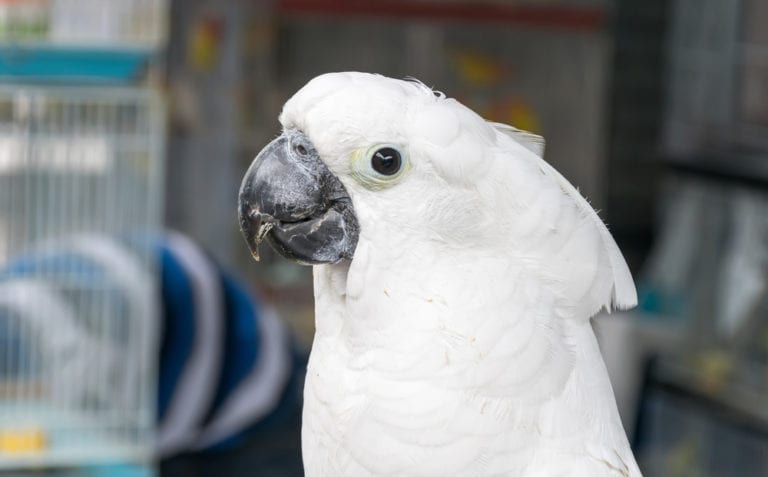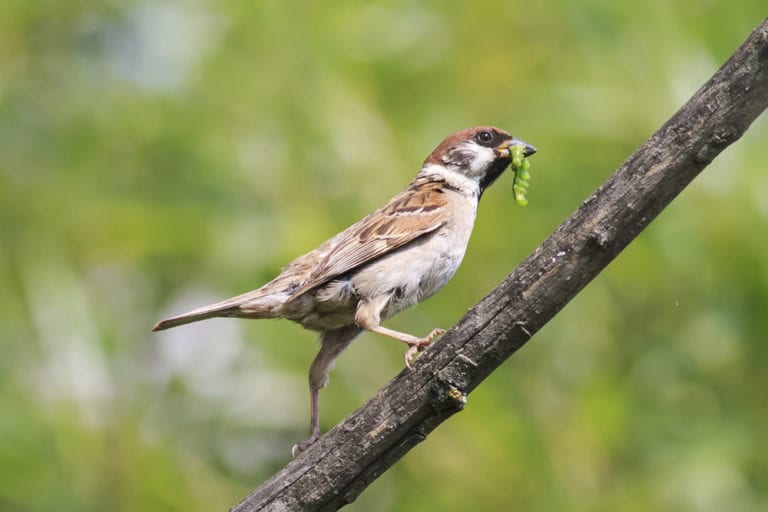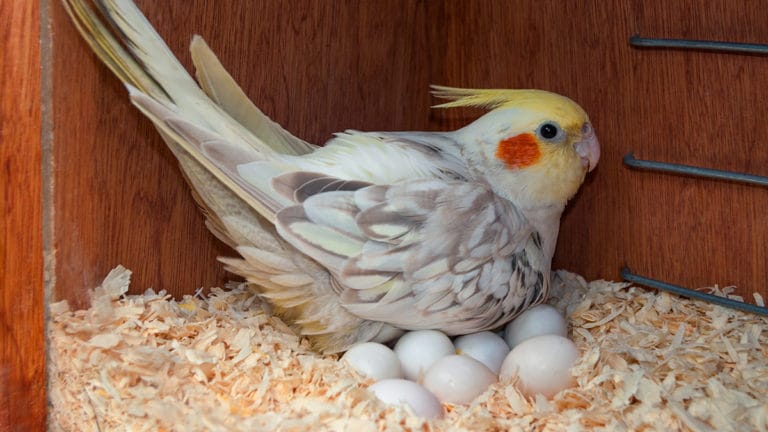One of the most bewildering experiences for a person going through the wonderful early blush of a new love interest or the birth of a child is watching his or her avian companion go berserk over the new arrival. Sadly, because many people do not realize that most cases of avian jealousy can be avoided or altered, this often leads to the immediate or eventual relocation of the bird.
An avian behavior consultant is often contacted immediately, or very soon after, the introduction of another human or animal into the bird’s household because of negative changes in the bird’s behavior. This may result in aggressive targeting of the newcomer, and even objects owned or regularly used by that individual may be targeted. Some birds may be more inwardly focused and target themselves, mutilating their feathers, bird cages or toys. Other birds may become noisy or less manageable.
Any individual — especially one who takes a considerable amount of the bird’s favorite person’s time and attention — may be both the trigger and the focus of a bird’s jealousy. It is the nature of most hookbills to have a companion, and its expectation would be that the companion would remain loyal to it, most of the time. When a bird’s human companion suddenly begins to focus his attention on another animal or human, the bird may be shocked and may try to drive away the opposition by being aggressive to that individual.
Safety & Security
Set clear boundaries to lessen the occurrence of problem behaviors, upon which a modification program can take hold where there are existing problems. This is accomplished by assuring that the bird is always in a situation where it feels secure and where it understands its position within the family. Encourage the bird to entertain itself and to not depend upon people as its sole entertainment. Teach the bird which behaviors are acceptable and which are not.
A bird in this type of environment knows that it is loved, protected and respected. It receives the food, housing, rest and loving, playful interactions that keep it physically healthy and emotionally well adjusted. It understands what it is, and is not, permitted to do.
Teach the bird to play with toys inside its cage and on a play gym, on the sofa, the floor or a bed. Set perimeters by using a sheet or old blanket to represent them. They can be folded or unfolded to give the bird an area that is permissible to play on when the bird is on a large, flat area. This discourages the acquisition and protection of other territory. The bird will perceive itself as playing on your territory (the sheet) instead of its own.
Build Flexibility
Some people attempt to make their birds feel secure by maintaining a strict schedule. This often creates a bird with a relatively rigid personality, intolerant of change. Some of these birds become upset if, for example, its dinner is not provided by a particular time, configuration or individual. One umbrella cockatoo began to destroy its feathers whenever its owner did not return home from work within 30 minutes.
Socialization
Some people devote their entire private home lives to their avian friends and then promptly demote them to secondary status when a new romance or other interest arises. Not only is this emotionally unhealthy for all parties involved, it is an extremely cruel thing to do to the bird. It has absolutely no idea that things would ever change and may become extremely depressed or angry when things, especially if another individual is involved.
If the bird sees that people visit the home, it realizes that it is not the sole focus of its person’s life. Favorite treats may be offered by family members and friends. Even if the bird does not want anyone other than its person handling it, company — especially people who frequently compliment the bird and generously dole out goodies — can be an interesting and welcome change. The bird’s social horizons and life focus will be broadened, and it will be emotionally healthier.
The bird’s favorite person plays an important part in the socializing process. Whenever the bird accepts food, cage cleaning or any kind of interaction with another person, even just sitting comfortably while people are visiting in the area near its cage or play gym, it will accept these situations more readily if its favorite person praises it while these events take place.
When praising, make eye contact, and use exaggerated vocal inflections. Be clear regarding the reason for your praise, for example: “Ricky, you are such a good boy” or, “Thank you Ricky, for being such a good boy and letting John feed you a peanut.” It’s that simple to reinforce good behavior.
An emotionally healthy bird is one that is flexible. It understands that more than one family member may provide food, clean its cage or offer entertainment. The bird also knows that no new person is going to try to handle it if it declines the interaction. Although it may prefer the company of or being handled by a particular person, it is comfortable in the presence of other family members and familiar visitors. Birds that comfortably experience varied schedules, people and locations are usually extremely tolerant of change.
Take Precautions
Avoid the development of negative behavior whenever possible. This is especially true of birds that like to climb down and bite the objects of their wrath. Until the bird is accustomed to someone else getting attention, be sure that it is locked inside its cage. It may scream or throw toys or food around, but it will not be able to inflict physical injury. Encourage the newcomer to feed treats to your bird while it is inside its cage and unable to fly or to hop off and attack that person. Be sure to praise your bird profusely when it accepts the treats.
Learn your bird’s body language. Some may become completely wound up in the presence of others and may bite indiscriminately. Signs differ according to species and the individual. For example, for Amazon owners, if your bird is strutting around with its tail feathers fanned, chattering or calling loudly and its pupils are pinning, it is more likely to bite everyone who comes near — even you. Avoid getting yourself into that position. Simply leave the bird alone until it calms down.
Prepare For Change
If the bird’s cage or play gym needs to be moved after the arrival of a new family member, do so well in advance of the new arrival, thus giving the bird time to acclimate. If the anticipated arrival is an infant, for example, set up its crib and all its furniture in advance. Wrap a doll in blankets, and place it inside the crib.
For the first few times, pick up the bird and take it to the new crib and doll. Talk to the bird, and tell it how wonderful it is. Rearrange the doll’s blanket while holding the bird. Later, pick up the doll occasionally, holding and talking to it in sight of the bird. Then, talk to the bird, praising it, while still holding the doll, making the bird part of the entire evolving experience.
If the new arrival is an adult human or another animal, place all needed furniture or equipment in their locations and repeat the exercise above. Explain what is going to happen to the bird, using cheerful and loving tones. Make the idea of a new person or animal an exciting and enjoyable experience in which the bird is an integral part. If the new person visits frequently in anticipation of moving in, allow the bird to come out on a perch or play gym to join you when eating, conversing or watching television. The bird’s favorite person, or people, as well as the newcomer, must praise it profusely, because many birds do not seem to care what anyone other than their owners think.
If the new family member is another bird, don’t wait until its arrival to change cages or cage location. If a new cage is being purchased for the existing bird or if its cage is to be relocated because of the newcomer, do so in advance of the new bird’s arrival. Allow the existing bird to acclimate. If the old cage is going to be used for the new bird, clean if necessary, and introduce it into the area where the new bird will be kept. Purchase new toys for both birds, allowing the existing bird to keep its old toys, as well.
The Big Day
Birds are visual by nature, and nothing can provoke a jealous reaction faster than when a bird’s person walks into the room holding a strange bird, baby, animal or cuddling a new romantic interest. If, however, the bird is being held affectionately by its favorite person the first time it lays eyes on the newcomer, and its person tells the new arrival (even if it is an infant or animal) that the bird is loved very much and that it is a very important family member, the introduction often flows quite smoothly. After all, the bird is obviously greatly loved, and the new arrival is obviously secondary to it and not much of a threat.
What If It’s Too Late?
What should you do if your bird has already begun chasing your beloved around the house, screeches loudly when that person enters the room or takes aggressive action if the person does something so blatantly “volatile” as hugging or kissing you? Clarify the situation. Before deciding what kind of program to develop, differentiate whether the bird is behaving out of jealousy or if it is merely being territorial.
In the case of jealousy, the relationship of the bird and its primary person must be considered. As with any other problem behavior, it is not enough to simply address the problem without first addressing the triggers. Make sure some of the aforementioned criteria are established, giving the bird clear boundaries and comfortable socialization. If the bird tries to attack the focus of its jealousy, becomes noisy upon seeing that individual, begins to mutilate feathers or displays any other negative behavior, the response of the bird’s favorite person is integral to changing its behavior.
First, do not reinforce the bird’s reaction. If you talk to the bird to scold or to reassure it, you have just “trained” it to continue the behavior. If you immediately stop hugging your significant other in response to the bird’s reaction, you have also reinforced its behavior. The same goes for hugging, scratching, picking it up, offering treats or any other type of interaction between you and the bird. The best thing to do, if possible, is to ignore your feathered companion until it calms down. If you are in the middle of a hug, continue to do so until the bird relaxes. If it doesn’t, simply leave the room, returning when the bird calms down.
Include your bird in activities with the new family member, placing its cage or gym near you while you interact. Look at the bird, talk to it, smile at it and, above all, praise it — even if it’s just standing there doing nothing in particular. This reinforces the bird’s positive behavior, especially in relationship to its new “competition,” while it lessens its feelings of jealousy.
Worst Case Scenario
What if your bird never warms up to the newcomer? The answer might surprise you. Birds are not dogs and cannot be expected to love or to accept handling by everyone; however, with appropriate and sensitive interaction, orchestrated by their favorite people, there is no reason why they cannot accept newcomers into the household.
The new relationships may take many forms, from loving acceptance to a relatively constant state of the “cold shoulder.” It is not necessary for a bird to love all of the individuals its person loves. It is only necessary that it cohabitates with them without exhibiting problem behavior.
It is usually people who create the situations that lead to avian behavior problems and, unfortunately, it is human nature to focus on them and ignore the many attributes that still exist. By teaching our birds to be flexible, sociable and well-rounded, we prepare them for life as it really is and ensure our ability to offer them a lifetime of love, regardless of whether or not they love everyone we love. Those of us who have people who love us unconditionally and who respect and accept our devotion to our avian companions, regardless of how the bird feels about them, are among the most fortunate of all individuals.
Birds are wonderful and charming companions. We must focus on their positive aspects and love them for what they are — and not for what we want them to be. With some preparation and good luck, there is no reason why they cannot continue their lives with us, regardless of who, or what, may come into our lives in the future. That’s what family is all about, isn’t it?
Posted By: Chewy Editorial
Featured Image: Via Shutterstock/Judy Crawford
Share:









